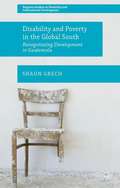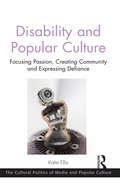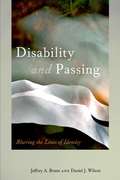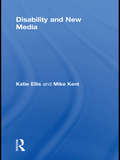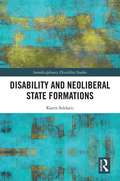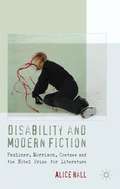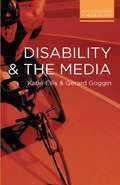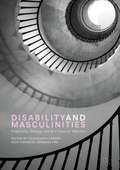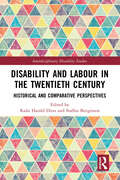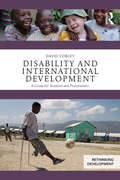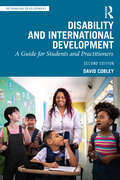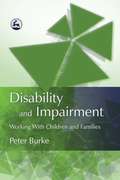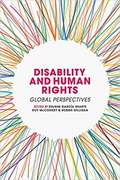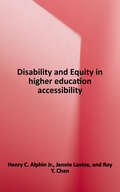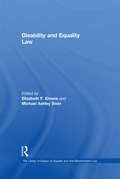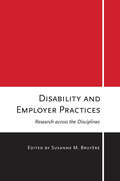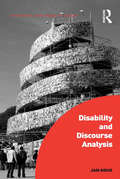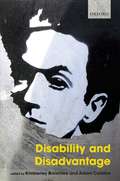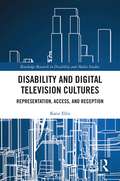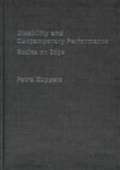- Table View
- List View
Disability and Religious Diversity
by Darla Schumm Michael StoltzfusThis edited collection of essays critically examines how diverse religions of the world represent, understand, theologize, theorize and respond to disability and/or chronic illness. Contributors employ a wide variety of methodological approaches including ethnography, historical, cultural, or textual analysis, personal narrative, and theological/philosophical investigation.
Disability and Poverty in the Global South: Renegotiating Development In Guatemala (Palgrave Studies in Disability and International Development)
by Shaun GrechDisability and Poverty in the Global South
Disability and Popular Culture: Focusing Passion, Creating Community and Expressing Defiance (The\cultural Politics Of Media And Popular Culture Ser.)
by Katie EllisAs a response to real or imagined subordination, popular culture reflects the everyday experience of ordinary people and has the capacity to subvert the hegemonic order. Drawing on central theoretical approaches in the field of critical disability studies, this book examines disability across a number of internationally recognised texts and objects from popular culture, including film, television, magazines and advertising campaigns, children’s toys, music videos, sport and online spaces, to attend to the social and cultural construction of disability. While acknowledging that disability features in popular culture in ways that reinforce stereotypes and stigmatise, Disability and Popular Culture celebrates and complicates the increasing visibility of disability in popular culture, showing how popular culture can focus passion, create community and express defiance in the context of disability and social change. Covering a broad range of concerns that lie at the intersection of disability and cultural studies, including media representation, identity, the beauty myth, aesthetics, ableism, new media and sport, this book will appeal to scholars and students interested in the critical analysis of popular culture, across disciplines such as disability studies, sociology and cultural and media studies.
Disability and Political Theory
by Barbara Arneil Nancy J. HirschmannThough disability scholarship has been robust in history, philosophy, English, and sociology for decades, political theory and political science more generally have been slow to catch up. This groundbreaking volume presents the first full-length book on political theory approaches to disability issues. Barbara Arneil and Nancy J. Hirschmann bring together some of the leading scholars in political theory to provide a historical analysis of disability through the works of canonical figures, ranging from Hobbes and Locke to Kant, Rawls and Arendt, as well as an analysis of disability in contemporary political theory, examining key concepts, such as freedom, power and justice. Disability and Political Theory introduces a new disciplinary framework to disability studies, and provides a comprehensive introduction to a new topic of political theory.
Disability and Passing: Blurring the Lines of Identity
by Brune Jeffrey A. Wilson Daniel J.Why passing is a crucial concept in disability studies
Disability and Passing: Blurring the Lines of Identity
by Daniel J. Wilson Jeffrey A. BrunePassing--an act usually associated with disguising race --also relates to disability. Whether a person with a psychiatric disorder struggles to suppress aberrant behaviour to appear "normal" or a person falsely claims a disability to gain some advantage, passing is a pervasive and much discussed phenomenon. Nevertheless, Disability and Passing is the first anthology to examine this issue. The editors and contributors to this volume explore the intersections of disability, race, gender, and sexuality as these various aspects of identity influence each other and make identity fluid. They argue that the line between disability and normality is blurred, discussing disability as an individual identity and as a social category. And they discuss the role of stigma in decisions about whether or not to pass. Focusing on the United States from the nineteenth century to the present, the essays in Disability and Passing speak to the complexity of individual decisions about passing and open the conversation for broader discussion. Contributors include: Dea Boster, Allison Carey, Peta Cox, Kristen Harmon, David Linton, Michael Rembis, and the editors. Jeffrey A. Brune is Assistant Professor of History at Gallaudet University. Currently he is working on his monograph, Disability Stigma and the Modern American State. Daniel J. Wilson is Professor of History at Muhlenberg College. He is author of several books, including Polio: The Biography of a Disease and Living with Polio: The Epidemic and Its Survivors.
Disability and New Media (Routledge Studies in New Media and Cyberculture)
by Katie Ellis Mike KentDisability and New Media examines how digital design is triggering disability when it could be a solution. Video and animation now play a prominent role in the World Wide Web and new types of protocols have been developed to accommodate this increasing complexity. However, as this has happened, the potential for individual users to control how the content is displayed has been diminished. Accessibility choices are often portrayed as merely technical decisions but they are highly political and betray a disturbing trend of ableist assumption that serve to exclude people with disability. It has been argued that the Internet will not be fully accessible until disability is considered a cultural identity in the same way that class, gender and sexuality are. Kent and Ellis build on this notion using more recent Web 2.0 phenomena, social networking sites, virtual worlds and file sharing. Many of the studies on disability and the web have focused on the early web, prior to the development of social networking applications such as Facebook, YouTube and Second Life. This book discusses an array of such applications that have grown within and alongside Web 2.0, and analyzes how they both prevent and embrace the inclusion of people with disability.
Disability and Neoliberal State Formations: The Case Of Australia (Interdisciplinary Disability Studies)
by Karen SoldaticDisability and Neoliberal State Formations explores the trajectory of neoliberalism in Australia and its impact on the lives of Australians living with disability, including Aboriginal and Torres Strait Islander peoples. It examines the emergence, intensification and normalisation of neoliberalism across a 20-year period, distilling the radical changes to disability social security and labour-market law, policy and programming, and the enduring effects of the incremental tightening of disability eligibility carried out by Australian governments since the early 2000s. Incorporating qualitative interviews with disabled people, disability advocates, services and the policy elite, alongside extensive documentary material, this book brings to the fore the compounding effects of neoliberal reforms for disabled people’s wellbeing and participation. The work is of international significance as it illustrates the importance of looking beyond the UK, EU and the USA to critically understand the historical development and policy mobility of disability neoliberal retraction from smaller economies, such as Australia, to the global economic centre.
Disability and Modern Fiction
by Alice HallDisability and Modern Fiction explores shifting definitions and representations of physical and mental impairment in 20th and 21st century culture through a focus on the work of William Faulkner, Toni Morrison and JM Coetzee. Taking as its starting point Virginia Woolf's essay 'On Being Ill' (1930), the book argues that focusing on literary representations of disability opens up new critical categories for the analysis of fiction. Through consideration of their work as critics and Nobel Prize-winning public intellectuals, as well as authors, the book proposes new ways of reading Faulkner, Morrison and Coetzee in relation to one another, and in doing so highlights the ethical, aesthetic and imaginative challenges they pose to readers.
Disability And The Media
by Katie Ellis Gerard GogginThis concise, integrated introduction to the complex relationship between disability and the media offers a roadmap to the key areas of participation, access and representation. Bringing together international theoretical work and research on disability, with analysis and examples across a diverse range of media forms – from radio, to news, popular television and new digital technologies – this unique text explores the potential for establishing a more diverse, rich and just media. Providing an approachable but critical introduction to the field, Katie Ellis and Gerard Goggin show how disability – like the closely connected areas of race and gender – is a pervasive issue in how the media represent society.
Disability and Masculinities
by Cassandra Loeser Vicki Crowley Barbara PiniIn recent years, attending to diversity in the cultivation of embodied identity has been given additional impetus as a result of intersectionality theory. Despite this, a key gap remains in terms of knowledge about masculinity and disability. This book addresses this lacuna through ten empirical chapters organised through the inter-related themes of corporeality, pedagogy and the critique of otherness. Each of the chapters positions the subject of masculinity and disability as a site of cultural pedagogy by affirming different ways of knowing of masculinity beyond dominant ideologies that normalise a particular masculine body and relegate disabled masculinities to the position of abnormal 'Other'. Part One focuses on pedagogy. Through the materialities of 'medicalized colonialism', imprimaturs of 'relational genealogies', 'compounding differences' and an analytical exposition of some of the neo-colonial conditions of the Global South within spatially-considered places of the Global North, Chapter 1 examines the denial of human rights to the Indigenous Anishinaabe community of Shoal Lake 40 in Canada. Chapter 1 theorises masculine corporeality in terms that take seriously First Nations', national and transnational body politics seriously. Chapter 2 examines the ways that movement and affect serve as a form of pedagogy for boys with autism spectrum in schools. Part Two's focus on corporeality includes an examination of the nexus of disability and diagnosis in the context of transgender men's experiences of mental health, and a discussion of the ways that intersex individuals who identify as men and have experienced 'genital normalising surgery' actively negotiate pluralised masculinities. The focus on media in Part Three encompasses a study of the mis-interpellation of the disabled male subject in Australian male literature, research on the discursive strategies utilised in media representations of disabled veterans in Turkey, and an analysis of the political implications of depictions of masculinity, disability and sexualities in a variety television program. Part Four's theme of self-stylisation takes up the questions of men's reconstructions of masculinity in light of Lyme Disease, the potential pleasures of heterosexuality for young men with a hearing disability in the realm of Australian-Rules Football, and the diverse ways that disabled men negotiate patriarchal masculinity in intimate relationships.
Disability and Labour in the Twentieth Century: Historical and Comparative Perspectives (Interdisciplinary Disability Studies)
by Radu Harald Dinu Staffan BengtssonThis volume puts disability and labour at the centre of historical enquiry. It offers fresh perspectives on the history of disability and labour in the twentieth century and highlights the need to address the topic beyond regional boundaries. Bringing together historians and disability scholars from a variety of disciplines and regions, the chapters investigate various historical settings, ranging from work cooperatives to disability associations and informal workplaces, and analyse multiple meanings of labour in different political and economic systems through the lens of disability. The book’s contributors demonstrate that the nexus between labour and disability in modern, industrialised societies resists easy generalisations, as marginalisation and integration were often two sides of the same coin: While the experience of many disabled people has been marked by exclusion from mainstream production, labour also became a vehicle for integration and emancipation. Addressing one of the research gaps of the disability history field, which has long been dominated by British and North American perspectives, the book sheds light on less-studied examples from Scandinavian countries and Eastern Europe including Czechoslovakia, Poland, the Soviet Union, Bulgaria and Romania. Cutting across national, cultural and class divides the volume provides a springboard for reflections on common experiences of disability and labour during the twentieth century. It will be of interest to all scholars and students working in the field of disability studies, sociology and labour history.
Disability and International Development: A Guide for Students and Practitioners (Rethinking Development)
by David CobleyDespite growing evidence of a close and complex relationship between disability and poverty, development policy, planning and programming has often failed to take full account of the concerns of disabled people. However, following the 2006 UN Convention on the Rights of Persons with Disabilities and the post-2015 sustainable development agenda, which promises to ‘leave no one behind’, there have been increasing calls from governments and development agencies for disability to be mainstreamed into all development planning. Disability and International Development provides a comprehensive overview of key themes in the field of disability and development, including issues around identity, poverty, disability rights, education, health, livelihoods, disaster recovery and approaches to researching disability. The book engages with relevant theory and draws on existing literature in the field, as well as the author’s own research and teaching experience, to explore key issues using a range of examples taken from around the world. Written in an accessible and engaging style to suit both students and practitioners, the book also includes a wide range of reflection exercises, discussion questions and further reading suggestions, making it the perfect introduction to disability and international development.
Disability and International Development: A Guide for Students and Practitioners (Rethinking Development)
by David CobleyDisability and International Development provides a comprehensive overview of the key themes in the field of disability and development, including issues around identity, poverty, disability rights, education, health, livelihoods, disaster recovery and approaches to researching disability. As disability becomes increasingly prominent within the international development agenda, the need for governments and development actors to have a basic understanding of disability issues, as they seek to support disabled people to access their rights to full participation in society, has never been more acute. Drawing on a range of examples taken from around the world, this book introduces readers to the key topics and theories surrounding disability and development. The second edition of this popular textbook includes increased coverage of environmental accessibility, intersectionality, and reflections on the disproportionate impact of the COVID-19 pandemic on disabled people and the prospects for change in a post-pandemic environment. Written in an accessible and engaging style to suit both students and practitioners, the book includes a wide range of reflection exercises, discussion questions and further reading suggestions, making it the perfect introduction to disability and international development.
Disability and Information Technology
by Eliza VarneyDisability and Information Technology examines the extent to which regulatory frameworks for information and communication technologies (ICTs) safeguard the rights of persons with disabilities as citizenship rights. It adopts a comparative approach focused on four case studies: Canada, the European Union, the United Kingdom and the United States. It focuses on the tension between social and economic values in the regulation of ICTs and calls for a regulatory approach based on a framework of principles that reflects citizenship values. The analysis identifies challenges encountered in the jurisdictions examined and points toward the rights-based approach advanced by the UN Convention on the Rights of Persons with Disabilities as a benchmark in protecting the rights of persons with disabilities to have equal access to information. The research draws on a wealth of resources, including legislation, cases, interviews, consultation documents and responses from organisations representing persons with disabilities.
Disability and Impairment: Working with Children and Families
by Peter BurkeDisability and Impairment introduces professionals working with families to the everyday issues faced by disabled people of all ages in family life. Peter C Burke shows how social attitudes shape the world of the 'disabled family' either positively or negatively and the effects of stigma. He demonstrates the normality of disability - that children are children whatever their label - and the need for a sensitive professional understanding of the impact of both physical and learning disabilities on family members, in order to improve their quality of life. This book covers the spectrum of disability issues, and offers information and advice for professionals working with families and disability, explaining the value of family support, how to validate the feelings of siblings with disabled brothers and sisters, tackling social exclusion and understanding the role of lifelong professional help. Case studies and practice notes make this an accessible reference for social work students and practitioners.
Disability and Human Rights: Global Perspectives
by Edurne García Iriarte Roy McConkey Robbie GilliganExperienced by more than one billion people worldwide, disability is increasingly recognised as a human rights issue internationally. Completely up to date, Disability and Human Rights draws on cutting edge international research and real life examples to explore the global dimension of disability and to critically review progress on the implementation of the United Nations Convention on the Rights of Persons with Disabilities. <P><P> This book provides readers with an in-depth exploration of disability across key areas of hu-man rights, including health, education, employment, accessibility and independent living. It demonstrates how these issues are integral to achieving full and equal participation of disa-bled people in human societies across the life cycle. The book analyses the impact of poverty, the importance of support and the relevance of culture and it maps out how to make disability rights a reality in the coming decades. <P><P> Chapters are enriched with a wide range of international case examples and questions for reflection to deepen readers' understanding of the material. Students and practitioners from a wide range of backgrounds, including disability studies, human rights, social work and social care will benefit from this much-needed new global perspective on disability.
Disability and Equity in Higher Education Accessibility (Advances In Educational Marketing, Administration, And Leadership Ser.)
by Henry C. Alphin Jennie Lavine Roy Y. ChanEducation is the foundation of almost all successful lives. It is vital that learning opportunities are available on a global scale, regardless of individual disabilities or differences, and to create more inclusive educational practices. Disability and Equity in Higher Education Accessibility is a comprehensive reference source for the latest scholarly material on emerging methods and trends in disseminating knowledge in higher education, despite traditional hindrances. Featuring extensive coverage on relevant topics such as higher education policies, electronic resources, and inclusion barriers, this publication is ideally designed for educators, academics, students, and researchers interested in expanding their knowledge of disability-inclusive global education.
Disability and Equality Law (The\library Of Essays On Equality And Anti-discrimination Law Ser.)
by Elizabeth F. EmensThis interdisciplinary collection of essays addresses the theoretical, practical and legal dimensions of equality for persons with disabilities. The issues covered include the central problem of defining disability and impairment; the dilemma of same versus different treatment; the balance between autonomy and external influence and support; linkages to other anti-discrimination categories such as race and sex; the place of disability theory within identity politics; and issues of life, death, and our most intimate relationships. The articles reflect a wealth of international viewpoints and interdisciplinary areas which include philosophy, economics, memoirs, cultural studies, empirical studies and legal scholarship. The selection also includes classic texts which set out foundational ideas such as the social model of disability or the goal of integration, alongside essays that critique these conceptual mainstays. This volume brings into sharp focus a wide range of contentious and complex issues in the field of disability studies and is of interest to researchers and students from a wide range of fields.
Disability and Employer Practices: Research across the Disciplines
by Susanne M. BruyèreThis book is about the employment of people with disabilities in the United States and the important role of employer practices. Nearly one in five people report some form of disability, and they are only half as likely to be employed as those without disabilities. With the aging workforce and returning military veterans both contributing to increasing number of disabilities in the workplace, there is an urgent need for better ways to address continuing employment disparities for people with disabilities. Examining employer behaviors is critical to changing this trend. It is essential to understand the factors that motivate employers to engage this workforce and which specific practices are most effective. Disability and Employer Practices features research-based documentation of workplace policies and practices that result in the successful recruitment, retention, advancement, and inclusion of individuals with disabilities. The Cornell team whose work is featured in this book drew from multiple disciplines, data sources, and methodologies to learn where employment disparities for people with disabilities occur and to identify workplace policies and practices that might remediate them. The contributors include individuals with expertise in the fields of business, economics, education, environmental design and analysis, human resources, management, industrial/organizational psychology, public health, rehabilitation psychology, research methods, survey design, educational measurement, statistics, and vocational rehabilitation counseling. Contributors Linda Barrington, Institute for Compensation Studies, ILR School, Cornell University Susanne M. Bruyère, K. Lisa Yang and Hock E. Tan Institute on Employment and Disability, ILR School, Cornell University Hassan Enayati, K. Lisa Yang and Hock E. Tan Institute on Employment and Disability, ILR School, Cornell University William A. Erickson, K. Lisa Yang and Hock E. Tan Institute on Employment and Disability, ILR School, Cornell University Kevin Hallock, Institute for Compensation Studies, ILR School, Cornell University Arun Karpur, K. Lisa Yang and Hock E. Tan Institute on Employment and Disability, ILR School, Cornell University Lisa Nishii, Human Resource Studies, ILR School, Cornell University Ellice Switzer, K. Lisa Yang and Hock E. Tan Institute on Employment and Disability, ILR School, Cornell University Sarah von Schrader, K. Lisa Yang and Hock E. Tan Institute on Employment and Disability, ILR School, Cornell University Sara Van Looy, K. Lisa Yang and Hock E. Tan Institute on Employment and Disability, ILR School, Cornell University
Disability and Discourse Analysis (Interdisciplinary Disability Studies)
by Jan GrueDisability studies has engaged with discourse analysis in key works both from the UK and the USA. While the perspectives and analyses of discourse analysis have proved well suited for exploring disability, however, its methods have not been sufficiently developed in a disability studies context. Conversely, discourse analysts have traditionally been concerned with social issues and fields in which asymmetric power relations, marginalization, and discrimination play a central role, e.g. gender, race, ethnicity, and sexual orientation, all of which share many analytical features with disability. But although efforts have been made to integrate disability into the discourse analysis and conversation analysis canon, the link between the two fields needs to be strengthened. This ground-breaking volume contributes to this link by thoroughly applying the analytical vocabulary of discourse analysis to issues that are central to the field of disability studies. It strengthens disability studies by supplying case studies of representations and constructions of disability and disabled people in discourse, theorizes the role played by language in the social construction of disability, and makes disability a more salient topic for discourse analysts.
Disability and Disadvantage
by Kimberley Brownlee Adam CuretonThis book offers a much-needed investigation of moral and political issues concerning disability, and explores how the experiences of people with disabilities can lead to reconsideration of prominent positions on normative issues. Thirteen new essays examine such topics as the concept of disability, the conditions of justice, the nature of autonomy, health care distribution, and reproductive choices. The contributors are Norman Daniels, Ellen Daniels Zide, Leslie P. Francis, Christie Hartley, Richard Hull, Guy Kahane, F. M. Kamm, Rosalind McDougall, Jeff McMahan, Douglas MacLean,Susannah Rose, Anita Silvers, Julian Savulescu, Lorella Terzi, David Wasserman, and Jonathan Wolff.
Disability and Digital Television Cultures: Representation, Access, and Reception (Routledge Research in Disability and Media Studies)
by Katie EllisDisability and Digital Television Cultures offers an important addition to scholarly studies at the intersection of disability and media, examining disability in the context of digital television access, representation and reception. Television, as a central medium of communication, has marginalized people with disability through both representation on screen and the lack of accessibility to this medium. With accessibility options becoming available as television is switched to digital transmissions, audience research into television representations must include a corresponding consideration of access. This book provides a comprehensive and critical study of the way people with disability access and watch digital TV. International case studies and media reports are complimented by findings of a user-focused study into accessibility and representation captured during the Australian digital television switchover in 2013-2014. This book will provide a reliable, independent guide to fundamental shifts in media access while also offering insight from the disability community. It will be essential reading for researchers working on disability and media, as well as television, communications and culture; upper-level undergraduate and postgraduate students in cultural studies; along with general readers with an interest in disability and digital culture.
Disability and Difference in Global Contexts
by Nirmala ErevellesThis book explores the possibilities and limitations re-theorizing disability using historical materialism in the interdisciplinary contexts of social theory, cultural studies, social and education policy, feminist ethics, and theories of citizenship.
Disability And Contemporary Performance: Bodies On The Edge
by Petra KuppersDisability and Contemporary Performance presents a remarkable challenge to existing assumptions about disability and artistic practice. In particular, it explores where cultural knowledge about disability leaves off, and the lived experience of difference begins. Petra Kuppers, herself an award-winning artist and theorist, investigates the ways in which disabled performers challenge, change and work with current stereotypes through their work. She explores freak show fantasies and 'medical theatre' as well as live art, webwork, theatre, dance, photography and installations, to cast an entirely new light on contemporary identity politics and aesthetics. <p><p> This is an outstanding exploration of some of the most pressing issues in performance, cultural and disability studies today, written by a leading practitioner and critic.

